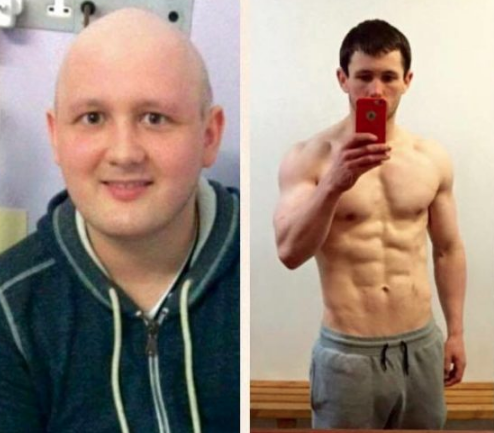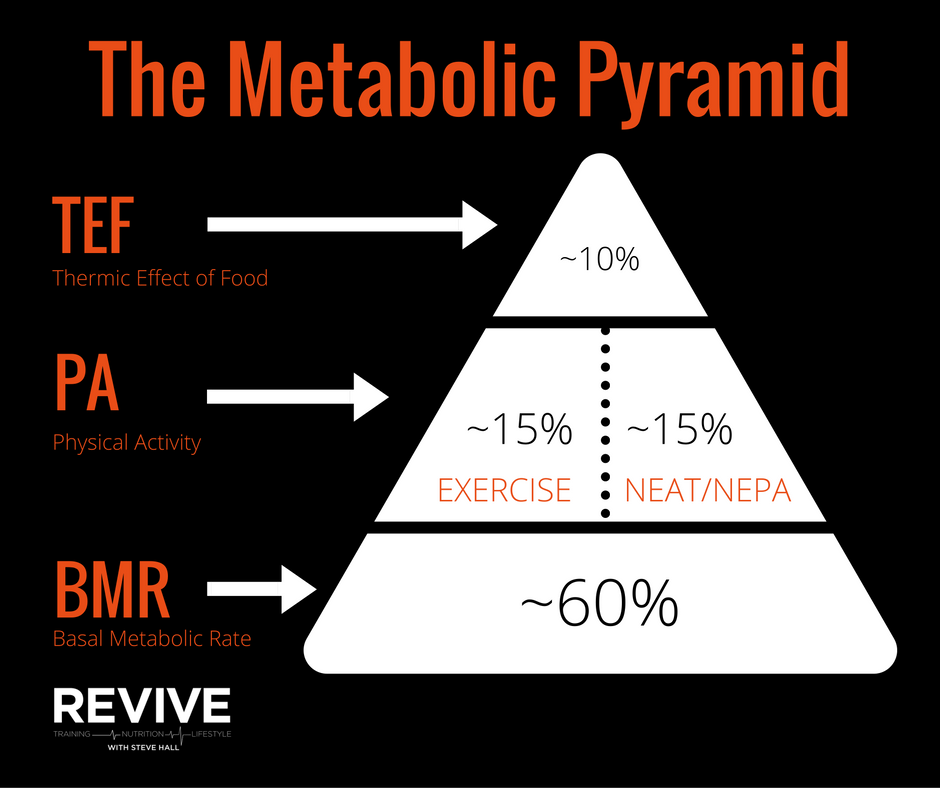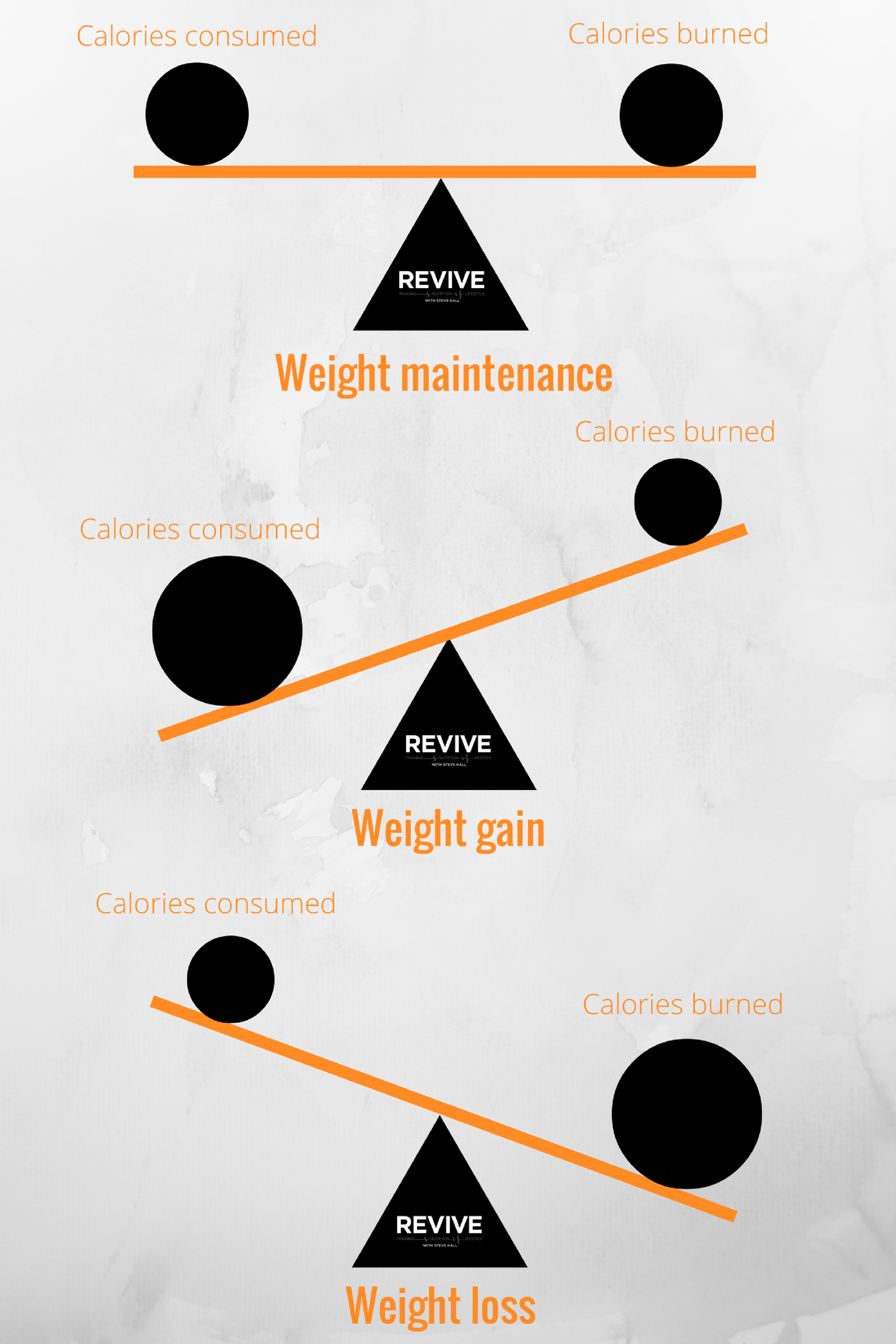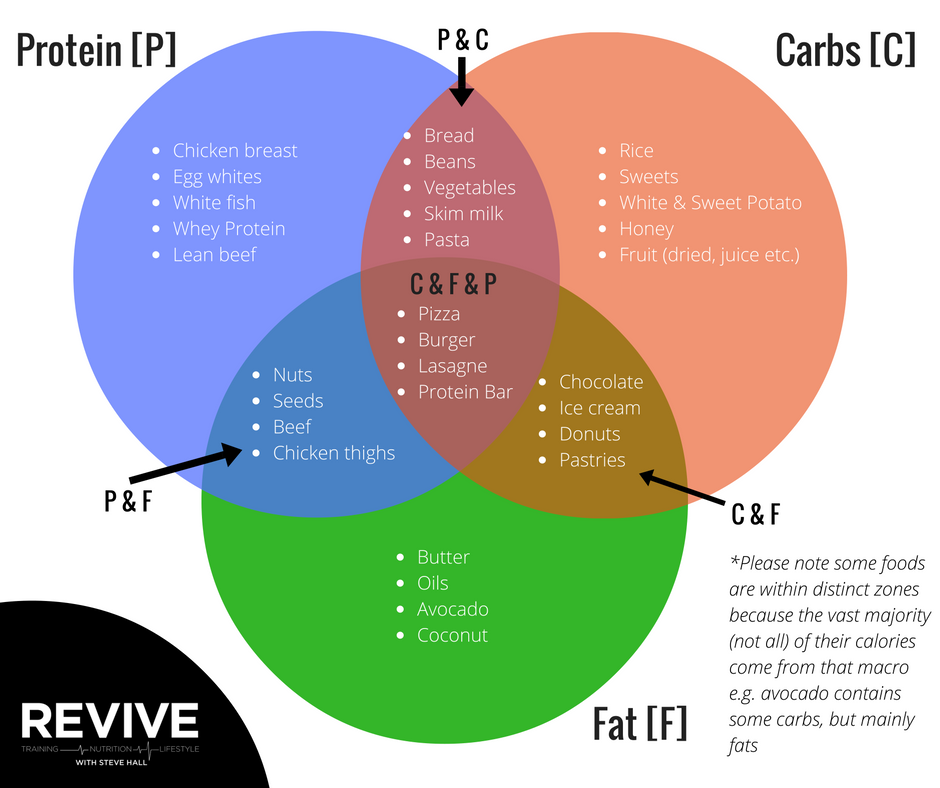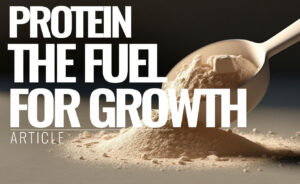
Revive Stronger
If you care about your health, you’ll read this

Getting your nutrition somewhat right is VERY important for health.
Coach Mark takes you through the most important aspects to consider when eating for health.
If you get this stuff under control, you’re more than 80% of the way there. However, sadly many people get confused, and mess up their priorities. Read this following short but very informative read by Mark and become an informed healthy eater.
Nutrition is almost definitely the most confusing topic within the fitness industry and within the general public community.
I really wanted to put this article together to help people get a good understanding of basic nutrition and give you a few small points to think about.
What to expect from this article:
- Energy Expenditure
- Energy balance
- Macronutrients
- Protein
- Fat
- Carbohydrates
- Supplements
I hope this will be a good resource for you and will help give clarity to some of the confusion that seems to be ever prevalent regarding nutrition.
There is a lot of misinformation out there.
Both from people who mean well but just miss some key points and downright charlatans looking to cash in on the general public’s lack of understanding. By reading this article and understanding the basics, you will then have a good base level of knowledge and for most people, to be honest, that is enough.
It is enough to make a start with your diet and it is enough to be able to recognise and ignore the bad stuff.
Table of Contents
Understanding Energy Expenditure
First of all, what is important to understand is that everyone’s dietary requirements are different.
Not only has everyone got different goals but their daily calorie requirements are different.
For example, a 100kg, 6ft male builder may easily maintain his weight on around 3500 or more calories per day, whereas a 50kg female office worker may only require 1800 calories per day. Your own personal maintenance calories (the amount of calories you require to maintain your current weight) will be determined on your overall daily energy expenditure. This breaks down into main 3 categories (which do also have sub categories).
- Basal metabolic rate (BMR) – These are the calories your body uses at rest. All of your organs from your brain function to your heart beating would all fall under your BMR. This is very individual to you and there is not much at all you can do about this.
- Physical Activity (PA) – Lifting weights, going for a run, playing football, anything that is purposeful exercise, that is exercise. Within this is also; Non exercise activity thermogenesis (NEAT) – These are the calories that you burn doing unconscious movements e.g. tapping your foot, your posture etc. Non exercise physical activity (NEPA) – These are calories lost through anything physical that isn’t planned formal exercise e.g. walking to the shops (this is often bunched under NEAT)
- Thermic effect of feeding (TEF) – These are the calories you use in the digestion process of the foods we eat.
All this put together adds up to your total daily energy expenditure (TDEE).
Once you have a rough idea of your TDEE, you can start to manipulate body composition.
Lose weight by reducing body fat or gain weight by building muscle, or simply maintaining how we are.
Learn more about how to maximise your own metabolism here.
Energy Balance
Energy balance is the relationship between energy in (calories consumed through food and drink) and energy out (calories used for our total energy requirements).
If you look up the term ‘energy balance’ this is the statement you will read:
“Energy balance” is the relationship between “energy in” (calories taken into the body through food and drink) and “energy out” (calories being used in the body for our daily energy requirements).
For us to maintain our body weight we must maintain a neutral energy balance.
Eg – calories in equal calories out.
For us to lose weight we must create a negative energy balance.
Eg – calories in are less than calories out.
For us to gain weight we must create a positive energy balance.
Eg – calories in are more than calories out.
This picture below may help:
Macronutrients
Macronutrients are nutrients that provide calories/energy.
Nutrients are substances needed for growth, our metabolism, and hormone regulation.
‘Macro’ meaning large, macronutrients are the nutrients our bodies require in large amounts.
There are three macronutrients:
- Protein
- Carbohydrates
- Fat
Each of these macronutrients provide us with energy and contain calories.
The calories of each macronutrient are:
- Protein = 4 calories per gram
- Carbohydrates = 4 calories per gram
- Fat = 9 calories per gram
For example, if an item of food contained 20g of protein, 15g of carbs and 10g of fat, that food would contain 230 calories.
Worked example – 20 x 4 = 80, 15 x 4 = 60, 10 x 9 = 90
80 + 60 + 90 = 230.
Alcohol is also a macro (not needed/wanted in large amounts) that contains 7 calories per gram.
Protein
Protein is made up of a chain of amino acids and its main role as a nutrient is to repair and maintain tissue in the body. A diet high in protein is beneficial for overall health but it’s also great when dieting as protein is very satiating. Including protein at every meal may help you feel fuller for longer.
Sources of protein:
- Meats
- Dairy products
- Fish
- Eggs
Other sources of protein, although in smaller amounts include whole grains, pulses, legumes, soy, and nuts.
Generally, I recommend most people try to consume around 0.6-1.2g of protein per pound of body weight, depending on their current goal. This is a rough guide as there may be circumstances where people may require more or even less that amounts.
Fat
Dietary fat and body fat must not be confused as the same thing. Dietary fat plays an important role in our bodies and health, for example hormone regulation. Avoiding dietary fat and having a really low-fat intake over time can be detrimental to health and leave you deficient of some important fatty acids.
There are different kinds of dietary fat:
- Saturated Fats – animal meat, milk. eggs, butter, cheese, coconut oil.
- Monounsaturated Fats – olive oil and other cooking oils that are liquid at room temperature.
- Polyunsaturated Fats – Omega 6 – vegetable oils, flax seeds, nuts. Omega 3 – fish oils.
- Trans Fats – margarine, bakery goods, sweets, crisps and other processed foods. Typically, nutrient void and probably advisable to limit this intake to some extent.
Generally I recommend most people try to consume around 0.3-0.6g of fat per pound of body weight. Again this is a rough guide as there may be circumstances where people may require more or even less that amounts.
Carbohydrates
Carbohydrates are the preferred source of energy for your body.
Your digestive system changes carbohydrates into glucose (blood sugar). Your body uses this sugar for energy for your cells, tissues and organs. It stores any extra sugar in your liver and muscles for when it is needed.
You will hear carbohydrates referred to as simple or complex. Simple carbohydrates include sugars found naturally in foods such as fruits, vegetables, milk, and milk products. They also include sugars added during food processing and refining. Complex carbohydrates include whole grain breads and cereals, starchy vegetables and legumes. Many of the complex carbohydrates are good sources of fibre.
Everyone’s required carbohydrate intake is different. It will be determined by your overall energy expenditure, which is again determined by your lifestyle, job, general activity level and goals.
Supplements
The supplement industry is a multimillion pound business that most often relies on the insecurities of people to market and sell their products. There is no real need to take any supplements but there are some that have more scientific weight behind them than others.
Below is a list of supplements that are generally considered to be beneficial when taken as part of an overall healthy, nutrient dense and goal dependent diet.
**Please note. I am not telling you should or shouldn’t use these supplements**
I recommend you look them up and make your own mind up whether or not you would like to include these in your diet.
- Whey protein – Whey protein is extremely high in quality protein and has a great amino acid profile. This is helpful when trying to build muscle in a gaining phase or retain muscle in a dieting phase. Whey is cheap to buy and very convenient. A great way to help boost protein intake.
- Creatine monohydrate – Creatine monohydrate is a very well researched supplement and has been shown to increase strength and growth of muscle tissue.
- Fish oil (omega 3) – Fish oil is a good option on days you don’t consume oily fish like tuna salmon etc. Around 3-6 capsules a day would be advisable.
- Multivitamin – A multi vitamin can be used as part of a healthy diet, rich in nutrients. It can act as a ‘buffer’ or cover your bases for getting sufficient micronutrients.
- Vitamin D3 – If you live in the UK or anywhere else where you do not get much sun light, a VitD supplement is advisable. One capsule per day year round.
If you are considering any of these supplements, I recommend you do some research and find out more about them, you can get a free sports supplement guide here.
WHAT NEXT?
If you liked this, you will love:
- Make your own custom made diet plan
- Get your macros set up right for your goal
- How to start flexible dieting
Join my free facebook group or add me on snapchat (revivestronger) and ask your question there, I will respond asap. Or if you’re after a fresh training programme I have a free 4 week plan using DUP that you can download for free here.
One more thing…
Do you have a friend who would love the above? Share this article with them and let me know what they think.
[bctt tweet=”If you care about your health, you’ll read this” username=”revivestronger”]
We are a personal coaching service that helps you achieve your goals. We want you to become the best version of yourself.


